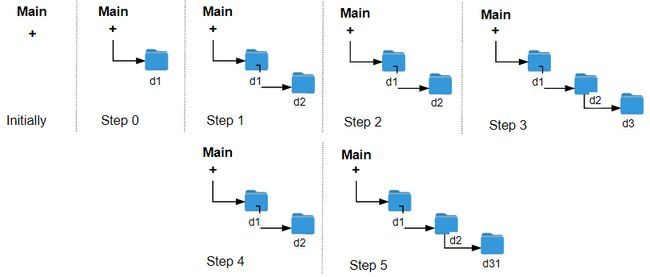- 【LeetCode 热题 100】53. 最大子数组和——(解法二)动态规划
xumistore
LeetCodeleetcode动态规划算法java
Problem:53.最大子数组和题目:给你一个整数数组nums,请你找出一个具有最大和的连续子数组(子数组最少包含一个元素),返回其最大和。子数组是数组中的一个连续部分。LeetCode热题100】53.最大子数组和——(解法一)前缀和文章目录整体思路完整代码时空复杂度时间复杂度:O(N)空间复杂度:O(N)整体思路这段代码同样旨在解决“最大子数组和”问题。它采用的是一种非常经典且标准的动态规划
- 【LeetCode 热题 100】76. 最小覆盖子串——(解法一)滑动窗口+数组
xumistore
LeetCodeleetcode算法职场和发展java
Problem:76.最小覆盖子串给你一个字符串s、一个字符串t。返回s中涵盖t所有字符的最小子串。如果s中不存在涵盖t所有字符的子串,则返回空字符串“”。文章目录整体思路完整代码时空复杂度时间复杂度:O(|S|+|t|)空间复杂度:O(k)或O(1)整体思路这段代码旨在解决一个经典的字符串问题:最小窗口子串(MinimumWindowSubstring)。问题要求在主字符串S中,找出一个包含目标
- 算法-每日一题(DAY11)每日温度
浮灯Foden
数据结构与算法-每日一题算法c++开发语言数据结构面试leetcode
1.题目链接:739.每日温度-力扣(LeetCode)2.题目描述:给定一个整数数组temperatures,表示每天的温度,返回一个数组answer,其中answer[i]是指对于第i天,下一个更高温度出现在几天后。如果气温在这之后都不会升高,请在该位置用0来代替。示例1:输入:temperatures=[73,74,75,71,69,72,76,73]输出:[1,1,4,2,1,1,0,0]
- 算法-每日一题(DAY12)最长和谐子序列
浮灯Foden
数据结构与算法-每日一题算法数据结构leetcode哈希算法c++面试
1.题目链接:594.最长和谐子序列-力扣(LeetCode)2.题目描述:和谐数组是指一个数组里元素的最大值和最小值之间的差别正好是1。给你一个整数数组nums,请你在所有可能的子序列中找到最长的和谐子序列的长度。数组的子序列是一个由数组派生出来的序列,它可以通过删除一些元素或不删除元素、且不改变其余元素的顺序而得到。示例1:输入:nums=[1,3,2,2,5,2,3,7]输出:5解释:最长和
- 【Leetcode】423. Reconstruct Original Digits from English
记录算法题解
LC栈队列串及其他数据结构leetcode算法c++数据结构
题目地址:https://leetcode.com/problems/reconstruct-original-digits-from-english/description/给定一个长nnn字符串sss,其是若干数字的英文小写单词连接在一起并且打乱顺序所得,要求将其还原为数字组成的字符串,并且数字按升序排列。题目保证答案存在。我们可以观察哪些字母只在某个数字中出现,然后逐个求出每个数字出现了多少
- Leetcode 1672. Richest Customer Wealth
小白菜又菜
Leetcode解题报告leetcode算法职场和发展
ProblemYouaregivenanmxnintegergridaccountswhereaccounts[i][j]istheamountofmoneytheithcustomerhasinthejthbank.Returnthewealththattherichestcustomerhas.Acustomer’swealthistheamountofmoneytheyhaveinallth
- Leetcode-423. Reconstruct Original Digits from English
K_W
算法javaleetcode算法
前言:为了后续的实习面试,开始疯狂刷题,非常欢迎志同道合的朋友一起交流。因为时间比较紧张,目前的规划是先过一遍,写出能想到的最优算法,第二遍再考虑最优或者较优的方法。如有错误欢迎指正。博主首发CSDN,mcf171专栏。博客链接:mcf171的博客——————————————————————————————Givenanon-emptystringcontaininganout-of-orderE
- LeetCode423. Reconstruct Original Digits from English
tigerhuli
LeetCode
Givenanon-emptystringcontaininganout-of-orderEnglishrepresentationofdigits0-9,outputthedigitsinascendingorder.Note:InputcontainsonlylowercaseEnglishletters.Inputisguaranteedtobevalidandcanbetransforme
- LeetCode 423. Reconstruct Original Digits from English 解题报告
骆小坑
编程解题leetcode
LeetCode423.ReconstructOriginalDigitsfromEnglish解题报告题目描述Givenanon-emptystringcontaininganout-of-orderEnglishrepresentationofdigits0-9,outputthedigitsinascendingorder.InputcontainsonlylowercaseEnglishl
- Leetcode 423. Reconstruct Original Digits from English
小白菜又菜
Leetcode解题报告leetcodelinux算法
ProblemGivenastringscontaininganout-of-orderEnglishrepresentationofdigits0-9,returnthedigitsinascendingorder.AlgorithmCounttheoccurrencesofcharactersbasedonuniqueletters—forexample,theletter‘z’onlyapp
- LeetCode 解题解决方案 —— 使用 Rust 实现
凌朦慧Richard
LeetCode解题解决方案——使用Rust实现leetcode-rustmyleetcodesolutionsinrust项目地址:https://gitcode.com/gh_mirrors/le/leetcode-rust1.项目介绍该项目是用户aylei在GitHub上创建的一个仓库,名为leetcode-rust,它包含了用Rust语言编写的LeetCode题目的解题方案。这个仓库的目的
- LeetCode高频100题刷题记录之——二叉树的中序遍历
巍巍微澜
Leetcode刷题记录leetcode算法python二叉树
1问题描述给定一个二叉树,按照左,中,右的顺序遍历这棵树。2代码实现思路很简单,从左到右遍历这颗二叉树即可。2.1递归代码实现#Definitionforabinarytreenode.#classTreeNode:#def__init__(self,val=0,left=None,right=None):#self.val=val#self.left=left#self.right=right#
- 双指针题解——反转字符串【LeetCode】
潮_
我的学习记录双指针篇_刷题笔记开发语言数据结构算法leetcodepython
344.反转字符串一、算法逻辑(逐步通顺讲解每一步思路)该题要求将字符数组s原地反转,即不能使用额外数组,直接在输入数组上进行修改。✅1️⃣初始化双指针指针left指向起始位置(索引0);指针right指向末尾位置(索引len(s)-1);✅2️⃣使用双指针交换字符每次将s[left]与s[right]对换;然后将left向右移动一位,right向左移动一位;重复此过程,直到两个指针相遇或交叉(即
- 二叉树题解——二叉树的中序遍历【LeetCode】统一写法版本
94.二叉树的中序遍历一、算法逻辑(逐步通顺地讲解)这段代码的目标是实现中序遍历,即按照顺序:左子树→当前节点→右子树遍历整个二叉树,并返回节点值的列表。与常见的递归或传统栈方法不同,这里使用的是一种“统一写法”技巧,将“节点值访问”与“节点展开”分开处理,流程如下:1️⃣初始化结构使用一个栈保存待处理元素(可能是TreeNode或int);初始栈中放入整棵树的根节点;结果数组rst用来保存最终遍
- (LeetCode 热题 100) 51.N皇后
YuforiaCode
LeetCode热题100题解leetcode算法java深度优先
目录题目:题目描述:题目链接:思路:核心思路:思路详解:代码:Java代码:题目:题目描述:题目链接:51.N皇后-力扣(LeetCode)思路:核心思路:dfs全排列思路详解:由题规则:皇后可以攻击与之处于同一行或者同一列或同一斜线上的棋子。我们可以提炼得到同一行只能放一个皇后,而且每一行都要放一个皇后,因为有n个皇后。所以搜索思路和全排列的搜索思路一样:从第0行开始枚举皇后的某个位置,然后从上
- LeetCode第300题_最长递增子序列
@蓝莓果粒茶
算法leetcode算法职场和发展学习c#游戏python
LeetCode第300题:最长递增子序列文章摘要本文详细解析LeetCode第300题"最长递增子序列",这是一道考察动态规划和二分查找的中等难度题目。文章提供了动态规划和贪心+二分查找两种实现方案,包含C#、Python、C++三种语言实现,配有详细的算法分析和性能对比。适合学习动态规划和二分查找的读者。核心知识点:动态规划、二分查找、贪心算法难度等级:中等推荐人群:具备基础算法知识,想要提升
- LeetCode第301题_删除无效括号
@蓝莓果粒茶
算法leetcode算法职场和发展c#学习pythonc++
LeetCode第301题:删除无效括号文章摘要本文详细解析LeetCode第301题"删除无效括号",这是一道考察DFS和括号匹配的困难难度题目。文章提供了DFS和BFS两种实现方案,包含C#、Python、C++三种语言实现,配有详细的算法分析和性能对比。适合学习深度优先搜索和字符串处理的读者。核心知识点:DFS、BFS、括号匹配、字符串处理难度等级:困难推荐人群:具备基础算法知识,想要提升搜
- Leetcode 239. 滑动窗口最大值(单调队列解法)
题目:给你一个整数数组nums,有一个大小为k的滑动窗口从数组的最左侧移动到数组的最右侧。你只可以看到在滑动窗口内的k个数字。滑动窗口每次只向右移动一位。返回滑动窗口中的最大值。1>deque=newArrayDequeSystem.out.print(e.get(0)+":"+e.get(1)+""));System.out.println();}returnres;}/***如果当前队尾有元素
- leetcode(力扣) 239. 滑动窗口最大值(单调队列)
深度不学习!!
个人笔记交流学习leetcodepython
文章目录题目描述思路分析完整代码题目描述给你一个整数数组nums,有一个大小为k的滑动窗口从数组的最左侧移动到数组的最右侧。你只可以看到在滑动窗口内的k个数字。滑动窗口每次只向右移动一位。返回滑动窗口中的最大值。示例1:输入:nums=[1,3,-1,-3,5,3,6,7],k=3输出:[3,3,5,5,6,7]解释:滑动窗口的位置最大值[13-1]-3536731[3-1-3]5367313[-
- Leetcode 百题训练 239. 滑动窗口最大值
XiaoO_QAQ
leetcode算法数据结构
239.滑动窗口最大值题目描述:给你一个整数数组nums,有一个大小为k的滑动窗口从数组的最左侧移动到数组的最右侧。你只可以看到在滑动窗口内的k个数字。滑动窗口每次只向右移动一位。返回滑动窗口中的最大值。示例1:输入:nums=[1,3,-1,-3,5,3,6,7],k=3输出:[3,3,5,5,6,7]解释:滑动窗口的位置最大值--------------------[13-1]-3536731
- leetcode:1218. 最长定差子序列
uncle_ll
编程练习-Leetcodeleetcode算法最长定差子序列动态规划1218
题目来源:力扣(LeetCode)链接:https://leetcode-cn.com/problems/longest-arithmetic-subsequence-of-given-difference给你一个整数数组arr和一个整数difference,请你找出并返回arr中最长等差子序列的长度,该子序列中相邻元素之间的差等于difference。子序列是指在不改变其余元素顺序的情况下,通过
- LeetCode 1456. 定长子串中元音的最大数目
千楼
滑动窗口与双指针leetcode算法职场和发展
题目链接1456.定长子串中元音的最大数目题目描述给定一个字符串s和一个整数k,请找出字符串中长度为k的子串中包含的最大元音字母数量。元音字母包括a、e、i、o、u。解法分析:滑动窗口法核心思路该解法采用滑动窗口技术,通过维护一个长度为k的窗口,遍历字符串时动态计算窗口内的元音字母数量,从而找到最大值。具体步骤如下:右指针扩展窗口,统计当前字符是否为元音并累加计数当窗口长度达到k后,左指针开始滑动
- [Leetcode] 594. 最长和谐子序列 java 哈希表
niceHou666
Leetcodeleetcodejava哈希表
和谐数组是指一个数组里元素的最大值和最小值之间的差别正好是1。现在,给定一个整数数组,你需要在所有可能的子序列中找到最长的和谐子序列的长度。示例1:输入:[1,3,2,2,5,2,3,7]输出:5原因:最长的和谐数组是:[3,2,2,2,3].思想:哈希表,求map.get(nums[i])和map.get(nums[i+1])的最大和classSolution{publicintfindLHS(
- LeetCode 643. 子数组最大平均数 I
千楼
滑动窗口与双指针leetcode算法职场和发展
题目链接643.子数组最大平均数I题目描述给定一个整数数组nums和一个整数k,找出长度为k的连续子数组的最大平均数,并返回该值。要求结果误差小于10^-5。解法分析:滑动窗口法核心思路该解法采用滑动窗口技术,通过维护一个长度为k的窗口,遍历数组时动态计算窗口内元素的和,从而找到最大和,最终求得最大平均数。具体步骤如下:右指针扩展窗口,累加当前元素到窗口和当窗口长度达到k后,左指针开始滑动,每次减
- LeetCode 70:爬楼梯|递归到动态规划全路径解析
kiki_2411
算法设计与分析leetcode动态规划算法
本篇博客将通过LeetCode第70题“ClimbingStairs”为例,系统讲解从递归暴力解法到记忆化搜索、再到动态规划及空间优化的四种典型思路,适合算法初学者深入掌握递归与DP基础。文章目录LeetCode70|爬楼梯一、题目描述二、思路分析三、方法一:递归(不带记忆)思路C++代码四、方法二:递归+记忆化搜索(Top-DownDP)思路五、方法三:动态规划(Bottom-Up)思路六、方法
- LeetCode 438. 找到字符串中所有字母异位词 (C++实现)
姚先生97
LeetCode滑动窗口leetcodec++算法
1.题目描述给定两个字符串s和p,找到s中所有p的异位词的子串,返回这些子串的起始索引。不考虑答案输出的顺序。示例1:输入:s=“cbaebabacd”,p=“abc”输出:[0,6]解释:起始索引等于0的子串是“cba”,它是“abc”的异位词。起始索引等于6的子串是“bac”,它是“abc”的异位词。示例2:输入:s=“abab”,p=“ab”输出:[0,1,2]解释:起始索引等于0的子串是“
- Python版-LeetCode 学习:438. 找到字符串中所有字母异位词
guyu1003
LeetCode算法字符串pythonleetcode算法
给定一个字符串s和一个非空字符串p,找到s中所有是p的字母异位词的子串,返回这些子串的起始索引。字符串只包含小写英文字母,并且字符串s和p的长度都不超过20100。说明:字母异位词指字母相同,但排列不同的字符串。不考虑答案输出的顺序。示例1:输入:s:"cbaebabacd"p:"abc"输出:[0,6]解释:起始索引等于0的子串是"cba",它是"abc"的字母异位词。起始索引等于6的子串是"b
- leetcode(力扣) 594. 最长和谐子序列 (伪滑动窗口法)(哈希表法)
深度不学习!!
个人笔记交流学习leetcodepython
题目链接:https://leetcode-cn.com/problems/longest-harmonious-subsequence/题目分析:题目中说可以通过删除一些元素或不删除元素、且不改变其余元素的顺序而得到。说到不改变其他元素的顺序,但是答案最终返回的是数组的长度,并且可以删除或者不删除其中的一些元素,那么就可以无视顺序进行操作。法一(伪滑动窗口):首先对数组进行排序。设置两个指针维护
- 设计哈希集合【set】【拉链法】【位运算法】【定长拉链法】 - 哈希表本质深度解析
weixin_47868976
哈希算法散列表算法
LeetCode705设计哈希集合-哈希表本质深度解析题目描述设计一个哈希集合(HashSet),不使用任何内建的哈希表库,实现以下操作:add(key):向哈希集合中插入值keyremove(key):将给定值key从哈希集合中删除contains(key):返回哈希集合中是否存在这个值key数据范围:0data;public:MyHashSet(){//10^6+1大小的数组,key直接作为索
- [257] 二叉树的所有路径
紫菜(Nori)
数据结构与算法细节TODO算法数据结构leetcode
利用树的先序遍历,采用递归和迭代方式实现迭代方式有待优化/**@lcapp=leetcode.cnid=257lang=java**[257]二叉树的所有路径*///@lccode=start/***Definitionforabinarytreenode.*publicclassTreeNode{*intval;*TreeNodeleft;*TreeNoderight;*TreeNode(){}
- 项目中 枚举与注解的结合使用
飞翔的马甲
javaenumannotation
前言:版本兼容,一直是迭代开发头疼的事,最近新版本加上了支持新题型,如果新创建一份问卷包含了新题型,那旧版本客户端就不支持,如果新创建的问卷不包含新题型,那么新旧客户端都支持。这里面我们通过给问卷类型枚举增加自定义注解的方式完成。顺便巩固下枚举与注解。
一、枚举
1.在创建枚举类的时候,该类已继承java.lang.Enum类,所以自定义枚举类无法继承别的类,但可以实现接口。
- 【Scala十七】Scala核心十一:下划线_的用法
bit1129
scala
下划线_在Scala中广泛应用,_的基本含义是作为占位符使用。_在使用时是出问题非常多的地方,本文将不断完善_的使用场景以及所表达的含义
1. 在高阶函数中使用
scala> val list = List(-3,8,7,9)
list: List[Int] = List(-3, 8, 7, 9)
scala> list.filter(_ > 7)
r
- web缓存基础:术语、http报头和缓存策略
dalan_123
Web
对于很多人来说,去访问某一个站点,若是该站点能够提供智能化的内容缓存来提高用户体验,那么最终该站点的访问者将络绎不绝。缓存或者对之前的请求临时存储,是http协议实现中最核心的内容分发策略之一。分发路径中的组件均可以缓存内容来加速后续的请求,这是受控于对该内容所声明的缓存策略。接下来将讨web内容缓存策略的基本概念,具体包括如如何选择缓存策略以保证互联网范围内的缓存能够正确处理的您的内容,并谈论下
- crontab 问题
周凡杨
linuxcrontabunix
一: 0481-079 Reached a symbol that is not expected.
背景:
*/5 * * * * /usr/IBMIHS/rsync.sh
- 让tomcat支持2级域名共享session
g21121
session
tomcat默认情况下是不支持2级域名共享session的,所有有些情况下登陆后从主域名跳转到子域名会发生链接session不相同的情况,但是只需修改几处配置就可以了。
打开tomcat下conf下context.xml文件
找到Context标签,修改为如下内容
如果你的域名是www.test.com
<Context sessionCookiePath="/path&q
- web报表工具FineReport常用函数的用法总结(数学和三角函数)
老A不折腾
Webfinereport总结
ABS
ABS(number):返回指定数字的绝对值。绝对值是指没有正负符号的数值。
Number:需要求出绝对值的任意实数。
示例:
ABS(-1.5)等于1.5。
ABS(0)等于0。
ABS(2.5)等于2.5。
ACOS
ACOS(number):返回指定数值的反余弦值。反余弦值为一个角度,返回角度以弧度形式表示。
Number:需要返回角
- linux 启动java进程 sh文件
墙头上一根草
linuxshelljar
#!/bin/bash
#初始化服务器的进程PId变量
user_pid=0;
robot_pid=0;
loadlort_pid=0;
gateway_pid=0;
#########
#检查相关服务器是否启动成功
#说明:
#使用JDK自带的JPS命令及grep命令组合,准确查找pid
#jps 加 l 参数,表示显示java的完整包路径
#使用awk,分割出pid
- 我的spring学习笔记5-如何使用ApplicationContext替换BeanFactory
aijuans
Spring 3 系列
如何使用ApplicationContext替换BeanFactory?
package onlyfun.caterpillar.device;
import org.springframework.beans.factory.BeanFactory;
import org.springframework.beans.factory.xml.XmlBeanFactory;
import
- Linux 内存使用方法详细解析
annan211
linux内存Linux内存解析
来源 http://blog.jobbole.com/45748/
我是一名程序员,那么我在这里以一个程序员的角度来讲解Linux内存的使用。
一提到内存管理,我们头脑中闪出的两个概念,就是虚拟内存,与物理内存。这两个概念主要来自于linux内核的支持。
Linux在内存管理上份为两级,一级是线性区,类似于00c73000-00c88000,对应于虚拟内存,它实际上不占用
- 数据库的单表查询常用命令及使用方法(-)
百合不是茶
oracle函数单表查询
创建数据库;
--建表
create table bloguser(username varchar2(20),userage number(10),usersex char(2));
创建bloguser表,里面有三个字段
&nbs
- 多线程基础知识
bijian1013
java多线程threadjava多线程
一.进程和线程
进程就是一个在内存中独立运行的程序,有自己的地址空间。如正在运行的写字板程序就是一个进程。
“多任务”:指操作系统能同时运行多个进程(程序)。如WINDOWS系统可以同时运行写字板程序、画图程序、WORD、Eclipse等。
线程:是进程内部单一的一个顺序控制流。
线程和进程
a. 每个进程都有独立的
- fastjson简单使用实例
bijian1013
fastjson
一.简介
阿里巴巴fastjson是一个Java语言编写的高性能功能完善的JSON库。它采用一种“假定有序快速匹配”的算法,把JSON Parse的性能提升到极致,是目前Java语言中最快的JSON库;包括“序列化”和“反序列化”两部分,它具备如下特征:
- 【RPC框架Burlap】Spring集成Burlap
bit1129
spring
Burlap和Hessian同属于codehaus的RPC调用框架,但是Burlap已经几年不更新,所以Spring在4.0里已经将Burlap的支持置为Deprecated,所以在选择RPC框架时,不应该考虑Burlap了。
这篇文章还是记录下Burlap的用法吧,主要是复制粘贴了Hessian与Spring集成一文,【RPC框架Hessian四】Hessian与Spring集成
- 【Mahout一】基于Mahout 命令参数含义
bit1129
Mahout
1. mahout seqdirectory
$ mahout seqdirectory
--input (-i) input Path to job input directory(原始文本文件).
--output (-o) output The directory pathna
- linux使用flock文件锁解决脚本重复执行问题
ronin47
linux lock 重复执行
linux的crontab命令,可以定时执行操作,最小周期是每分钟执行一次。关于crontab实现每秒执行可参考我之前的文章《linux crontab 实现每秒执行》现在有个问题,如果设定了任务每分钟执行一次,但有可能一分钟内任务并没有执行完成,这时系统会再执行任务。导致两个相同的任务在执行。
例如:
<?
//
test
.php
- java-74-数组中有一个数字出现的次数超过了数组长度的一半,找出这个数字
bylijinnan
java
public class OcuppyMoreThanHalf {
/**
* Q74 数组中有一个数字出现的次数超过了数组长度的一半,找出这个数字
* two solutions:
* 1.O(n)
* see <beauty of coding>--每次删除两个不同的数字,不改变数组的特性
* 2.O(nlogn)
* 排序。中间
- linux 系统相关命令
candiio
linux
系统参数
cat /proc/cpuinfo cpu相关参数
cat /proc/meminfo 内存相关参数
cat /proc/loadavg 负载情况
性能参数
1)top
M:按内存使用排序
P:按CPU占用排序
1:显示各CPU的使用情况
k:kill进程
o:更多排序规则
回车:刷新数据
2)ulimit
ulimit -a:显示本用户的系统限制参
- [经营与资产]保持独立性和稳定性对于软件开发的重要意义
comsci
软件开发
一个软件的架构从诞生到成熟,中间要经过很多次的修正和改造
如果在这个过程中,外界的其它行业的资本不断的介入这种软件架构的升级过程中
那么软件开发者原有的设计思想和开发路线
- 在CentOS5.5上编译OpenJDK6
Cwind
linuxOpenJDK
几番周折终于在自己的CentOS5.5上编译成功了OpenJDK6,将编译过程和遇到的问题作一简要记录,备查。
0. OpenJDK介绍
OpenJDK是Sun(现Oracle)公司发布的基于GPL许可的Java平台的实现。其优点:
1、它的核心代码与同时期Sun(-> Oracle)的产品版基本上是一样的,血统纯正,不用担心性能问题,也基本上没什么兼容性问题;(代码上最主要的差异是
- java乱码问题
dashuaifu
java乱码问题js中文乱码
swfupload上传文件参数值为中文传递到后台接收中文乱码 在js中用setPostParams({"tag" : encodeURI( document.getElementByIdx_x("filetag").value,"utf-8")});
然后在servlet中String t
- cygwin很多命令显示command not found的解决办法
dcj3sjt126com
cygwin
cygwin很多命令显示command not found的解决办法
修改cygwin.BAT文件如下
@echo off
D:
set CYGWIN=tty notitle glob
set PATH=%PATH%;d:\cygwin\bin;d:\cygwin\sbin;d:\cygwin\usr\bin;d:\cygwin\usr\sbin;d:\cygwin\us
- [介绍]从 Yii 1.1 升级
dcj3sjt126com
PHPyii2
2.0 版框架是完全重写的,在 1.1 和 2.0 两个版本之间存在相当多差异。因此从 1.1 版升级并不像小版本间的跨越那么简单,通过本指南你将会了解两个版本间主要的不同之处。
如果你之前没有用过 Yii 1.1,可以跳过本章,直接从"入门篇"开始读起。
请注意,Yii 2.0 引入了很多本章并没有涉及到的新功能。强烈建议你通读整部权威指南来了解所有新特性。这样有可能会发
- Linux SSH免登录配置总结
eksliang
ssh-keygenLinux SSH免登录认证Linux SSH互信
转载请出自出处:http://eksliang.iteye.com/blog/2187265 一、原理
我们使用ssh-keygen在ServerA上生成私钥跟公钥,将生成的公钥拷贝到远程机器ServerB上后,就可以使用ssh命令无需密码登录到另外一台机器ServerB上。
生成公钥与私钥有两种加密方式,第一种是
- 手势滑动销毁Activity
gundumw100
android
老是效仿ios,做android的真悲催!
有需求:需要手势滑动销毁一个Activity
怎么办尼?自己写?
不用~,网上先问一下百度。
结果:
http://blog.csdn.net/xiaanming/article/details/20934541
首先将你需要的Activity继承SwipeBackActivity,它会在你的布局根目录新增一层SwipeBackLay
- JavaScript变换表格边框颜色
ini
JavaScripthtmlWebhtml5css
效果查看:http://hovertree.com/texiao/js/2.htm代码如下,保存到HTML文件也可以查看效果:
<html>
<head>
<meta charset="utf-8">
<title>表格边框变换颜色代码-何问起</title>
</head>
<body&
- Kafka Rest : Confluent
kane_xie
kafkaRESTconfluent
最近拿到一个kafka rest的需求,但kafka暂时还没有提供rest api(应该是有在开发中,毕竟rest这么火),上网搜了一下,找到一个Confluent Platform,本文简单介绍一下安装。
这里插一句,给大家推荐一个九尾搜索,原名叫谷粉SOSO,不想fanqiang谷歌的可以用这个。以前在外企用谷歌用习惯了,出来之后用度娘搜技术问题,那匹配度简直感人。
环境声明:Ubu
- Calender不是单例
men4661273
单例Calender
在我们使用Calender的时候,使用过Calendar.getInstance()来获取一个日期类的对象,这种方式跟单例的获取方式一样,那么它到底是不是单例呢,如果是单例的话,一个对象修改内容之后,另外一个线程中的数据不久乱套了吗?从试验以及源码中可以得出,Calendar不是单例。
测试:
Calendar c1 =
- 线程内存和主内存之间联系
qifeifei
java thread
1, java多线程共享主内存中变量的时候,一共会经过几个阶段,
lock:将主内存中的变量锁定,为一个线程所独占。
unclock:将lock加的锁定解除,此时其它的线程可以有机会访问此变量。
read:将主内存中的变量值读到工作内存当中。
load:将read读取的值保存到工作内存中的变量副本中。
- schedule和scheduleAtFixedRate
tangqi609567707
javatimerschedule
原文地址:http://blog.csdn.net/weidan1121/article/details/527307
import java.util.Timer;import java.util.TimerTask;import java.util.Date;
/** * @author vincent */public class TimerTest {
- erlang 部署
wudixiaotie
erlang
1.如果在启动节点的时候报这个错 :
{"init terminating in do_boot",{'cannot load',elf_format,get_files}}
则需要在reltool.config中加入
{app, hipe, [{incl_cond, exclude}]},
2.当generate时,遇到:
ERROR

